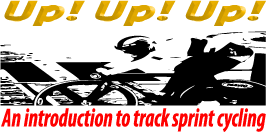03 - Road miles?
The first principle is that you must not fool yourself, and you are the easiest person to fool.
-- Richard Feynman
This is a highly controversial question - to even ask it brings down the wrath of the old school. There is some good science to suggest that a pure track sprinter needs minimal aerobic fitness and that the aerobic requirements may be best met by the judicious use of ergo sessions using short, sharp intervals. Maybe sprinters don't need any road miles at all, at least from the point of developing appropriate anaerobic capacity. It may be that the most efficient way to build the required aerobic capacity is not necessarily out on the road.
That said, the vast majority of track sprint cyclists like riding bikes and road rides are often a good way to get out of the velodrome or the gym, smell the roses and enjoy a social ride to the local coffee haunt. It's the author's opinion that this is of some benefit and a short, easy tootle on a road bike can also be of benefit as a bit of active recovery, keeping recovery rides short, under an hour's duration and at a very easy pace will minimise the catabolic effects of this kind of exercise.
A common justification for an aerobic base for sprinters is that it is required to assist in recovery between sprint efforts. It is the author's opinion that this is mostly a fallacy. The effects of long, slow distance riding directly reduce a sprinter's ability to fully exert themselves and the improved recovery reported as an anecdote by most sprinters who have taken this path may be a consequence of the inhibition in their anaerobic ability such that they recover better because they're less able to work as hard anaerobically.
Sprinters do need to be "fit", but they need to be fit for sprinting. They need a high level of anaerobic capacity and anaerobic recovery, this can be very efficiently and effectively trained with ergo sessions and the sample plan outlined later in this book uses ergo work to develop fitness. The general principle of "if you want to get good at something, you do that something" is very much a fundamental principle of this book and thus, we're saying that to get good at sprinting and recovering from sprints, train by sprinting and manipulating your recovery time between sprints.
